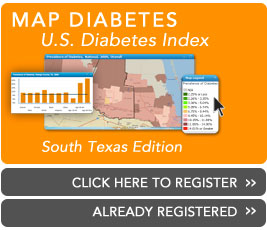Posted by Staff
Minority Diabetes Reports
Thursday, May 30th, 2013
JCEM: May 24, 2013
Context It is unknown whether intensive lifestyle modification (ILS) or metformin change sex steroids among premenopausal women without a history of polycystic ovarian syndrome (PCOS).
Objectives To examine one-year intervention impact upon sex steroids (estradiol, testosterone, dehydroepiandrosterone, and androstenedione [A4]) and sex hormone binding globulin (SHBG) and differences by race/ethnicity
Participants A subgroup of Diabetes Prevention Program (DPP) participants who were premenopausal, not using estrogen, without a history of PCOS or irregular menses, and who reported non-Hispanic white (NHW), Hispanic, or African-American race/ethnicity (n=301).
Interventions Randomization arms were: 1) ILS with the goals of weight reduction of 7% of initial weight and 150 minutes per week of moderate intensity exercise, 2) metformin 850 mg twice a day, or 3) placebo. Read more
Posted by Staff
Minority Diabetes Reports
Thursday, May 30th, 2013
StrokeAHA: April 25, 2013
Background and Purpose—We previously reported increased incidence of ischemic stroke among both blacks and whites with diabetes mellitus, especially in those aged <55 years. With rising prevalence of diabetes mellitus in the past decade, we revisit the impact of diabetes mellitus on stroke incidence in the same population (≈1.3 million) 5 and 10 years later.
Methods—This is a population-based study. First ischemic strokes among black and white residents of the 5-county Greater Cincinnati/Northern Kentucky region, aged ≥20 years, for periods 7/1993 to 6/1994, 1999, and 2005, were included in this analysis. Incidence rates were adjusted for sex, race, and age, as appropriate, to the 2000 US population. Read more
Posted by Staff
Minority Diabetes Reports
Thursday, May 30th, 2013
Diabetes: February 8, 2013
Advanced glycation end products (AGEs) and their receptors are strongly implicated in the development of diabetes complications. When stimulated by AGEs, the receptors for AGEs (RAGEs) induce inflammation and are thought to fuel disease progression. Soluble circulating RAGE (sRAGE) may counteract the detrimental effects of RAGE. We measured sRAGE in stored plasma from a random sample of 1,201 participants in the Atherosclerosis Risk in Communities (ARIC) Study who were aged 47–68 years, had normal kidney function, and had no history of cardiovascular disease. In cross-sectional analyses, black race, male sex, higher BMI, and higher C-reactive protein were independently associated with low sRAGE. Read more
Posted by Staff
Clinical Trials
Thursday, May 30th, 2013
Diabetes Care: June 1, 2013
Recent reports demonstrate an incredibly worrisome finding, specifically that there is an increased frequency of type 2 diabetes in youth. Given the importance of the problem of type 2 diabetes in youth and the need to effectively disseminate the information, our editorial team has elected to feature the TODAY study in this issue of Diabetes Care. Specifically, manuscripts from TODAY featured in this issue provide new data on the efficacy and safety of clinical treatment and longitudinal observation of specific risk factors and complications for the new “faces” for the type 2 diabetes epidemic, namely adolescents. Read more
Posted by Staff
Clinical Trials
Thursday, May 30th, 2013
Diabetes Care May 28, 2013
OBJECTIVE The 200 units/mL formulation of insulin degludec (IDeg 200 units/mL) contains equal units of insulin in half the volume compared with the 100 units/mL formulation. We compared the efficacy and safety of IDeg 200 units/mL once daily with 100 units/mL insulin glargine (IGlar) in insulin-naïve subjects with type 2 diabetes (T2DM) inadequately controlled with oral antidiabetic drugs.
RESEARCH DESIGN AND METHODS In this 26-week, open-label, treat-to-target trial, subjects (n = 457; mean HbA1c 8.3% [67 mmol/mol], BMI 32.4 kg/m2, and fasting plasma glucose [FPG] 9.6 mmol/L [173.2 mg/dL]) were randomized to IDeg 200 units/mL or IGlar, both given once daily in combination with metformin with or without a dipeptidyl peptidase-4 inhibitor. Read more
Posted by Staff
Clinical Trials
Thursday, May 30th, 2013
Diabetes Care May 22, 2013
OBJECTIVE To compare efficacy and safety of lixisenatide once daily versus exenatide twice daily in type 2 diabetes inadequately controlled with metformin.
RESEARCH DESIGN AND METHODS Adults with diabetes inadequately controlled (HbA1c 7–10%) with metformin were randomized to lixisenatide 20 μg once daily (n = 318) or exenatide 10 μg twice daily (n = 316) in a 24-week (main period), open-label, parallel-group, multicenter study. The primary objective was a noninferiority assessment of lixisenatide versus exenatide in HbA1c change from baseline to week 24. Read more
Posted by Staff
Clinical Trials
Thursday, May 30th, 2013
Diabetes Care: January 15, 2013
OBJECTIVE To assess the feasibility of using a disposable, self-administered, capillary blood sampling oral glucose tolerance test (OGTT) device in a community setting.
RESEARCH DESIGN AND METHODS Eighteen healthy and 12 type 2 diabetic volunteers underwent six 75-g OGTTs using a prototype device in the following three settings: unaided at home (twice); unaided but observed in clinic (twice); and performed by a nurse with simultaneous laboratory glucose assays of 0- and 120-min venous plasma samples (twice). The device displayed no results. A detachable data recorder returned to the clinic provided plasma-equivalent 0- and 120-min glucose values and key parameters, including test date, start and end times, and time taken to consume the glucose drink. Read more



























